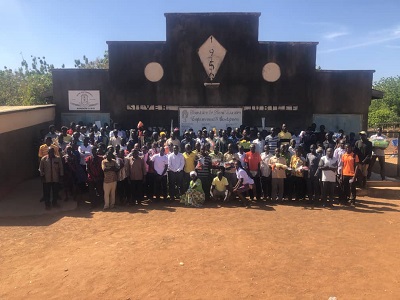
Farmers have been advised to treat the growing of crops and the rearing of animals for consumption and sale as a business which they do to earn an income, so that they can invest adequately into the venture and ensure demand-driven production.
A researcher with the Commonwealth Scientific Industrial Research Organisation (CSIRO) in Australia, Dr Julius Kotir, who gave the advice said, if farmers considered their trade as a business, they would be challenged to adopt best practices to cultivate their crops and also devise innovative ways to process a part of their produce for higher sales.
“In developed countries, people consider farming as a business, and so they invest hugely into agriculture and consider their farms as factories. In this regard, a lot of research is conducted into the cultivation and harvesting of crops that would inure to the benefits of the consumer,” he expressed.
Dr Kotir was speaking at a farmers’ forum at Nandom last Saturday by a social enterprise organisation called TiemeNdo on the theme, “Farming as a business: Enhancing the entrepreneurial capacity of smallholder farmers.”
The forum, which was introduced in 2017 by the organisation with its credit extension package, had supplied farm inputs such as subsidised fertiliser and improved seeds to over 1,500 farmers in 50 communities within the Nandom and Lambussie areas with close to 300 farmers as permanent clients who benefit from extension services as well regular tips on agriculture.
Dr Kotir explained that a demand-driven agriculture would focus on producing crops and livestock that met the nutritional needs of the people, adding that “in an area where there is say a pineapple factory, farmers will produce pineapples to feed the factory and not continue to produce the usual maize and beans, even when there is no demand for them”.
The researcher said there was the need to conduct extensive research into agriculture to enhance innovation and productivity such that, there would be new ways of dealing with pest and diseases as well as improve upon practices to increase yield.
The Director of Operations at the TiemeNdo, Mr Moses Yaanemenga, said the support to farmers had ensured increased yield such that, those who produced five bags of grains in 2018 increased to eight in 2019, representing a six per cent increase.
As part of consolidating their gains, Mr Yaanemenga announced that the organisation would focus on building the entrepreneurial capacity of farmers as well as employ consultancy and financial interventions.
A microbiologist at the School of Medicine and Medical Sciences of the University for Development Studies in Tamale, Professor Juventus Ziem, who is also a farmer, advised farmers to do away with primitive methods of cultivation and adopt conservation farming methods to protect the environment and be able to produce healthy food for consumption.
“Conservation agriculture helps to retain soil water and nutrients, leading to the maintenance of soil fertility and also improved health of consumers as the use of inorganic fertiliser is applied on crops cultivated,” he added.
FROM LYDIA DARLINGTION FORDJOUR, NANDOM







